Andrew Bado, más conocido como DarkFalzX, acaba de terminar su particular visión de Phantis, el clásico juego que publicase Dinamic y programara Carlos Abril para los ordenadores de 8 bits. Bado es un ferviente seguidor de aquella época, y decidió homenajear al propio Phantis y a otros clásicos de la época. Espero que os resulte interesante.
He publicado la entrevista original en inglés. He finalizado de traducirla al español, pulsa aquí para saltar a la charla traducida.
Interview with Andrew Bado
Question: How did the idea for the game come about? Nostalgia? I can imagine you turning on your old Sinclair and pressing the PLAY button on the cassette.
Answer: Nostalgia is a huge factor of course. I miss the sense of uncomplicated but massively fun adventure the games used to present. Games like Phantis, Game Over, Freddy Hardest and Trueno all took you on a quest – all without a tutorial, without an epic story (or any story really, if you didn’t have the cassette inlay!), no dialogue, no cutscenes, and still managed to remain super-memorable. I always wanted to do that!
Q:I think you got in touch with Phantis programmer Carlos Abril to ask about Dinamic’s videogame and using the character and environments of his game for motivation. How was the talk and why this game in particular?
A: Before starting Ulti I was obsessed with Phantis for a little while. I replayed every version of it I could get my hands on, and even tried to find any old articles or reviews of the game. That’s how I stumbled on a couple of interviews Carlos did around the release of his Zack Zero game. He seemed like a cool guy, so I sent him a message through the Crocodil’s «Contact Us» button on their website. And to my total surprise – Carlos replied! It just blew my mind that something like this is even possible.
Phantis was special to me – it was one of the few games of that era that was just easy enough to be beaten after a few tries. It was probably one of the first times I was able to beat a Spectrum game. I mean – back then it was almost customary for a game to just keep going – starting from the beginning with higher difficulty. Other games just gave you a black screen and a «Congratulations» after you completed the last stage. Phantis was a journey with a clear start and end points. For the time – that was epic.
Q: I keep a picture of Serena drawn and signed by Alfonso Azpiri. The artist made the cover for Phantis, the game and also the cover of our last issue. Did you think to ask Alfonso to make a cover for Ultiounus?
A: That would’ve been phenomenal, but I’m afraid I’m too poor to afford a professional artist – especially someone of the caliber of Mr Azpiri. In fact – when I was super-busy finishing Ultionus, I have contacted about a dozen artists offering, by my standards a substantial sum of money to them to do the box art. Most didn’t even bother to respond, and some complained the amount was laughably low. I ended up drawing the «cover» myself. With a mouse.
Q: So you think that AMC is a reference to your game. AMC was a great shoot’em-up. It was programmed by Pablo Ariza. What do you think about Spanish 8-bit games?
A: The 8-bit Astro Marine Corps was amazing! To this day I haven’t seen a more impressive ZX Spectrum game at least from a technical standpoint. The Amiga version was a massive letdown though.
Dinamic, Topo and OperaSoft games were some of the most memorable from my childhood – both, in good ways and bad. Dinamic – mostly great. Super polished games, great art, memorable characters. Topo – weird, sometimes confusing and definitely less memorable. OperaSoft – almost universally bad. There was just something about their engine that made the games almost unplayable.
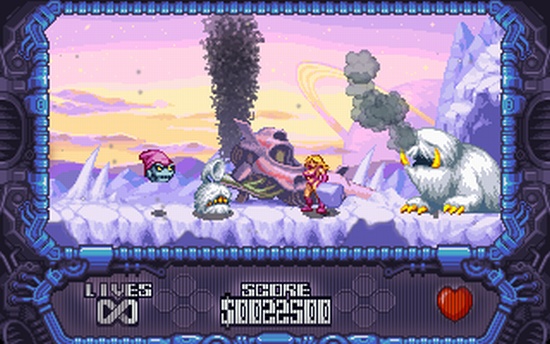
Q: In the 90s, I played a lot Jill of the Jungle (Epic MegaGames). It seems that the star of your game also knew the computer’s shareware from that time…
A: Haha – I had a PC 286 well into the late 90s, so I could only play the 2D shareware stuff. Jill of the Jungle, Dangerous Dave, Commander Keen, Bio Menace – those were some great games, though very different from the 8-bit stuff. Another very distinct era in home computer gaming and totally worth revisiting. There is a very recent game that came out on Steam – MURI – it was a cool callback to the time of EGA graphics and PC speaker music.
Q: Old games were much more complicated than today ones. However, Phantis had a fair dificult level. How much harder is Ultionus?
A: Old games were definitely harder. I sometimes let my 5-year-old son play the classic Spectrum games – and he just keeps losing without making any progress. I tried to make Ultionus‘ difficulty adjustable. If you don’t like hard games, but want to experience the adventure – play on Easy. Playing on Normal is much more difficult – go in expecting a challenge. Beating any mode unlocks the Hardcore mode. It’s hard. Very hard, and probably not always fair.
Q: What can you tell us about the composers of game music?
A: Oh – Jake and Luke were great to work with! I have first met Jake when we both worked at Gameloft NY – he is just a terrifically friendly, super-talented dude that is into all things oldschool games, same as me. Luke first came into my attention after he put out his Truthcannon album – he is awesomely talented.
When I first started looking for a musician for Ulti – I contacted several low-profile guys about writing music for the game. I really didn’t have the budget for anything fancy, so none of those guys were all that interested in working with me. One night I was just venting to Jake about how difficult it is to have people work with you on a very low budget, and he was like – «Why didn’t you ask me? I’d totally do it!». And he did – really, really well I might add: )
Q: I think you design your games with Game Maker, isn’t it? How is making a game with this tool and what other programs do you use to make your graphics, plan the levels, etc.?
A: Yes – I now use GameMaker Studio, but I have been using GameMaker starting with version 4 back in the early 2000s. It’s just a great tool for anyone with almost no programming knowledge. It takes almost no time at all to get stuff working in it – I’d recommend it to anyone who ever wanted to make a game. It’s simple to use and comes with most editors already built in.
For art I use a combination of Photoshop and ProMotion. Photoshop – for modeling sprites and backgrounds – to adjust the color palette and see how art layers together. ProMotion is a pixel animation program – I used it to animate everything in this game and Legend of Iya.
I also wrote my own animation editor for the large bosses and some of the background art that uses sprite scaling and rotation.
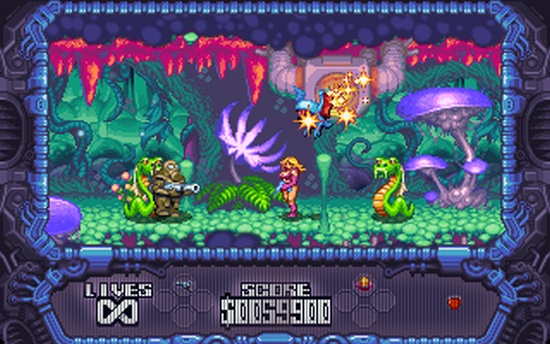
Q: Steam, Desura, Humble Store … It seems that there are many ways to publish games for indie
A: There is – but none of them are easy. Steam requires you to pass the Greenlight process, which can be grueling! Humble Store is small and a lot of its vendor features are still underdeveloped, though they do have very helpful staff that is more than happy to walk you through things you don’t understand. Desura – I am yet to be accepted onto their service. I really hope they weren’t offended by my game.
All of those services require waiting, paperwork and a lot of attention.
Q: How was the experience of porting the game to Ouya? I have read positive experiences from other indie developers as Locomalito (Maldita Castilla).
A: It was certainly not as difficult as I thought it might be, though the GameMaker still has ways to go before it supports the OUYA features without having to be kicked with a steel-toed boot. For instance – there is still no way to make the game purchasable on the OUYA store, and there are controller issues that crop up now and then. There were other, weirder problems too.
Q: You have worked in the past in many interesting games, more or less games with a retro or classic feel. What was your role? Seems that you can program and have a very high pixelating skills!!
A: Most games I have worked on to this day only used my pixel art. My programming skills are not great, and I never had the time to learn anything other than ZX Basic, Game maker and a little of Z80 ASM. Give me C# or Java – and I wouldn’t know what to do with it.
I have also worked in quality assurance in my early days – I guess it’s the «dues» everyone without a higher education degree has to pay to get into the industry.
Q: Ultinous. Ultiunous. Ultionous. Ultionus! Sorry, but I find it hard to guess the name of the videogame. Does it mean anything in particular?
A: If you read it as an English word It’s pronounced – All-Tea-OWN-Us.
The name is a bastardization of Latin «Ultionis» – meaning «revenge». When I decided I needed a name for my game that is not Phantis, my wife and I sat down for an afternoon looking for interesting and relevant words – especially «revenge», since it’s kind of the theme of Ulti. Ultionis stood out as something a game could be called, but the word sounded a bit too weird, so we changed one letter to make it more pronounceable to the western audience. Overall – I liked this method of name-choosing quite a bit.
Q: What about your other game, Legend of Iya? The Kickstarter campaign was very successful and the game looks amazing. How it’s coming along? What are the most difficult tasks you are facing with that game?
A: Legend of Iya is coming along nicely, though many systems seen in the game at the time of Kickstarter had to be redone, as they were just a mess. So far – a lot of coding and asset-reshuffling has been done, the game can now run on Linux and Android, and now works in higher resolution, but not much new in terms of showable content. This upsets my backers, but I gotta do it the way it feels right.
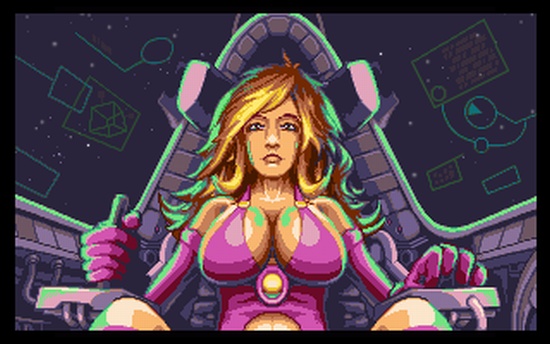
Q: What can you tell about the future, new projects? Focusing in Legend of Iya?
A: Yes – from now until next autumn – it’s Iya. After that – I have way too many projects that I have started and want to finish. I also definitely want to make more projects inspired by old Dinamic games – that’s for sure. I would’ve loved to do something like AMC, Game Over or Freddy Hardest. People who finished Ulti were calling for a sequel. I might do that – to see what Serena S is up to next.
Q: Thanks for your answers and keep your really good work!
A: No, thank you for finding this newsworthy! It’s awesome to know people care about the old games I grew up with, as I’m a little annoyed that the «retro culture» on the internet is all about NES and pretty much nothing else. NES was great, but where I’m from Speccy was king: )
Entrevista a Andrew Bado
Pregunta: ¿Cómo surgió la idea para el juego? ¿Fue un ataque de nostalgia? Te imagino encendiendo tu viejo Sinclair y pulsando el botón de PLAY en el cassette…
Respuesta: La nostalgia es un factor muy importante, por supuesto. Echo de menos las aventuras simples y enormemente divertidas que solían tener los juegos hace tiempo. Juegos como Phantis, Game Over, Freddy Hardest y Trueno te embarcaban en una aventura sin tutorial, ni historias épicas (¡cualquier historia si no habías leído las instrucciones del cassette!), ni diálogos, ni escenas de vídeo… Aún así, conseguían ser juegos memorables. ¡Siempre quise hacer algo así!.
Q: Creo que te pusiste en contacto con Carlos Abril, el programador de Phantis, comentándole la idea que tenías de utilizar tanto el personaje como los escenarios de su juego en tu creación. ¿Cómo fue la charla y porqué este juego en particular?
A: Antes de comenzar a desarrollar Ulti estaba obsesionado con Phantis. Probé todas las versiones que pude conseguir, e incluso me lancé a investigar, buscando artículos antiguos o revisiones del juego. Así es como me encontré con un par de entrevistas que le hicieron a Carlos durante el lanzamiento de Zack Zero. Parecía un buen tipo, así que le envié un mensaje a través del botón «Contacta con nosotros» de la página web de su empresa, Crocodile Entertainment. Y , para mi sorpresa, ¡Carlos respondió! Me volví loco en cuanto vi su contestación.
Phantis era muy especial para mí; fue uno de los pocos juegos de esa época que te podías pasar después de varios intentos. Probablemente fue de las primeras veces que tuve la oportunidad de llegar al final de un juego de Spectrum. Me explico: por aquel entonces era muy habitual que no se pudiera guardar la partida, obligando al jugador a comenzar desde el principio si perdía todas las vidas. Por otro lado, la mayoría de juegos te premiaban únicamente con una pantalla en negro y un escueto «felicidades» después de completar la última fase. Phantis fue un viaje de partida y regreso claramente definidos. Fue algo maravilloso para la época.
Q: Tengo un dibujo de Serena realizado y firmado por el propio Alfonso Azpiri; está colgado en mi salón. El dibujante hizo la portada de Phantis. ¿Llegaste a pensar la posibilidad de pedirle a Alfonso que hiciese lo propio con Ultionus?
A: Eso hubiera estado fenomenal, pero me temo que soy demasiado pobre para permitirme el coste de un artista profesional, en particular si hablamos de alguien del renombre del Sr. Azpiri. De hecho, cuando estaba terminando Ultionus, me puse en contacto con una docena de artistas, realizando varios presupuestos para que elaborasen el arte de la portada. La mayoría ni siquiera se molestó en responder, e incluso hubo algunos se quejaron de que la cantidad ofrecida era ridícula.
Al final, realicé el dibujo de la portada yo mismo. Con un ratón.
Q: Así que consideras a AMC como una referencia para tu juego. AMC fue un gran juego de acción, programado por Pablo Ariza. ¿Qué opinas acerca de los juegos de 8 bit españoles?
A: La versión 8 bits de Astro Marine Corps era fabulosa. De hecho, no conozco a día de hoy ningún juego de ZX Spectrum que lo supere a nivel técnico. En cambio, la versión de Amiga me pareció una gran decepción.
Los juegos de Dinamic, Topo y Opera Soft fueron los juegos que más recuerdo de mi infancia, tanto para lo bueno como para lo malo. Los de Dinamic eran todos geniales, cuidados, notables a nivel artístico y con protagonistas memorables. Sin embargo, los de Topo eran más extraños, a veces resultaban algo confusos y menos inspirados. Tengo un mal recuerdo de los juegos de Opera Soft; solían tener un planteamiento común que los hacía injugables.

Q: En los años 90 me harté de jugar a Jill of the Jungle (Epic MegaGames). Parece que la protagonista de tu juego también conocía los juegos shareware de aquella época…
A: ¡Jaja! Tuve un PC 286 hasta bien entrados los años 90, así que sólo podía meterle manoal shareware 2D. Jill of the Jungle, Dangerous Dave, Commander Keen, Bio Menace… eran grandes juegos, aunque muy distintos de los que salían para 8 bits. Los juegos de ordenador de la época… otro mundo que merece la pena volver a visitar. Existe un juego muy reciente que salió en Steam – MURI, una especie de regreso al pasado, a la época de los gráficos EGA y música que sonaba por el speaker del PC.
Q: Los juegos antiguos eran mucho más complicados que los que jugamos en la actualidad. Aún así, Phantis tenía un nivel de dificultad bastante ajustado. ¿Es muy difícil acabar Ultionus?
A: Efectivamente, los juegos antiguos eran mucho más difíciles. A veces le pongo el Spectrum a mi hijo, con 5 años, para que pruebe algunos clásicos de aquella época, y nunca llega a avanzar en ninguno de ellos. Mi intención era que Ultionus tuviese una dificultad bastante ajustada. Si no te gustan los juegos difíciles, pero quieres experimentar la aventura, ponte el modo fácil. Ahora bien, jugar en el modo Normal se hace mucho más duro; todo un reto. Si logramos llegar al final, se desbloquea el modo Hardcore. Difícil, incluso tramposo con el jugador en ocasiones.
Q: ¿Qué nos puedes contar acerca de los chicos que han compuesto la música del videojuego?
A: Oh, fue genial trabajar con Jake y Lucas. Conocí a Jake cuando ambos trabajábamos en Gameloft NY. Se trata de un tipo súper amable y con mucho talento, muy puesto en temas oldschool, al igual que yo. Por su parte, Lucas me llamó la atención después de que él lanzara su álbum Truthcannon, también sobrado de talento.
Cuando empecé a buscar a gente que realizara la música de Ulti me puse en contacto con varios tipos de perfil bajo para que aceptasen el trabajo. La verdad es que mi presupuesto no me permite grandes lujos, lo que hizo que ninguno de mis contactos quisiera aceptar dicha tarea. Una noche estaba comentándole este tema a Jake y de repente, exclamó «¿Por qué no me preguntaste? Lo haría encantado». Y vaya que sí lo hizo, muy bien además.
Q: Creo que utilizas Game Maker para diseñar tus juegos, ¿verdad? ¿Cómo resulta esta forma de trabajar? ¿Utilizas otras herramientas adicionales?
A: Así es, utilizo GameMaker Studio; de hecho, llevo usando esta herramienta desde la versión 4, desde el año 2000. Es una gran aplicación para cualquier persona que apenas posea conocimientos de programación. Se tarda muy poco tiempo en lograr progresos; lo recomendaría a cualquier persona que alguna vez pensó en hacer un juego. Es muy sencillo de usar e incluye un buen conjunto de editores.
Para crear los dibujos utilizo tanto Photoshop como ProMotion. Photoshop para modelar sprites y fondos, ajustar la paleta de colores y ver cómo combinan las distintas capas gráficas. ProMotion es un programa para animar píxeles y lo usé para tareas de animación tanto en Ulti como en Legend of Iya. Además, escribí mi propio editor de animación para los personajes de mayor tamaño – algunos Final Bosses- y también para animar algunos escenarios a través de técnicas de escalado y rotación.

Q: Steam, Desura, Humble Store … Parece que hay múltiples formas de publicar juegos para un desarrollador indie.
A: Las hay, pero ninguna de ellas te lo pone fácil. Con Steam es obligatorio superar el filtro de Greenlight, algo que puede ser terriblemente agotador. Humble Store es una tienda bastante modesta y muchas de las funciones de cara al proveedor están aún por desarrollar, aunque cuentan con un personal muy competente, encantado de ayudarte en los temas que no entiendas. En Desura estoy pendiente de que me acepten en su tienda. Espero que no se sintieran ofendidos por mi juego.
En resumen, todos estos servicios requieren de mucha paciencia, multitud de trámites y una enormededicación.
Q: ¿Cómo fue la experiencia de portar el juego a Ouya? He leído críticas bastante positivas acerca de dicha experiencia, entre ellas las de desarrolladores indie como Locomalito (Maldita Castilla).
A: Fue mucho más sencillo de lo que esperaba, aunque GameMaker aún le queda mucho por recorrer hasta que dicha exportación no requiera de unos cuantos empujones para llevarla a cabo. Por ejemplo, no hay manera de colocar el juego en la Store de Ouya para que pueda ser comprado. Me encontré con algún que otro problema bastante extraño, como errores producidos a la hora de manejar el juego.
Q: En el pasado has colaborado en juegos bastante interesante, juegos que en mayor o menor medida conservan el estilo de los videojuegos clásicos. ¿Cuál era tu papel en dichos juegos? Parece que se te da bien tanto la programación como el diseño gráfico.
A: La mayoría de los juegos en los que he trabajado hasta la fecha llevan mi sello artístico. Mis conocimientos de programación no son demasiado grandes, y nunca tuve tiempo para aprender lenguajes que no fueran ZX Basic, Game Maker o Z80 ASM. Si tuviera que programar en C# o Java no sabría cómo hacerlo.
También he trabajado en oficinas de calidad; fueron mis primeros pasos en el mundo laboral. – Es el precio a pagar para cualquier persona que quiera entrar en esta industria sin contar con un título universitario .
Q: Ultinous. Ultiunous. Ultionous. Ultionus! ¡Lo siento, pero me cuesta mucho acertar con el nombre exacto del juego! ¿Tiene algún significado en particular?
A: Si lo lees como una palabra inglesa se pronuncia «All-Tea-OWN-Us«. El nombre es una bastardización del latin «Ultionis» – que significa «venganza«. Cuando tomé la decisión de buscar un nombre para mi juego que no fuera Phantis, mi esposa y yo nos sentamos una tarde buscando palabras que resultasen interesantes y relevantes, relacionadas con la «venganza», ya que es el leit motiv de Ulti. La palabra Ultionis surgió como candidata, pero la palabra sonaba un poco extraña, así que cambiamos una letra para que fuese más fácil de pronunciar para el público occidental. La verdad es que disfruté bastante todo este proceso de decisión.
Q: Sobre tu otro juego, Legend of Iya, ¿qué puedes contarnos? La campaña en Kickstarter tuvo mucho éxito y el juego luce increíble. ¿Cómo va su desarrollo? ¿Qué es lo más complicado que te estás encontrando en su desarrollo?
A: Legend of Iya está saliendo muy bien, aunque muchos sistemas que se vieron en el juego en la época del Kickstarter tuvieron que ser reconstruidos, ya que eran un desastre. Hasta el momento se ha realizado mucho código, reubicando partes del mismo para su optimización. Ahora puede ser ejecutado en Linux y Android, y luce con una resolución mayor, pero no tengo contenidos nuevos que puedan mostrarse al público. Entiendo que esto moleste un poco a los que apoyaron la campaña, pero quiero asegurarme que todo salga según el plan establecido.

Q: Cuéntanos algo sobre tus planes futuros. Supongo que te centrarás en finalizar Legend of Iya.
A: Desde este momento y hasta el próximo otoño, el principal objetivo es Iya. Una vez terminado, tengo muchos proyectos a medio terminar. Tengo decidido que quiero hacer más proyectos inspirados en antiguos juegos de Dinamic. Me hubiera encantado hacer algo como AMC, Game Over o Freddy Hardest. Los jugadores que han llegado al final de Ulti eme han pedido una secuela. También podría tirar por ese camino y averiguar qué sucede con Serena.
Q: Muchas gracias por tus comentarios, Andrew. Suerte en tus proyectos.
A: Gracias a tí por encontrar interesantes todos estos temas. Me impresiona conocer a tantas personas que se siguen interesando por aquellos juegos con los que crecí; y es que me molesta que la «cultura retro» en Internet se centre tanto en NES y otras consolas. Sí, NES fue genial, pero en el lugar en el que nací, el Speccy era el auténtico rey.
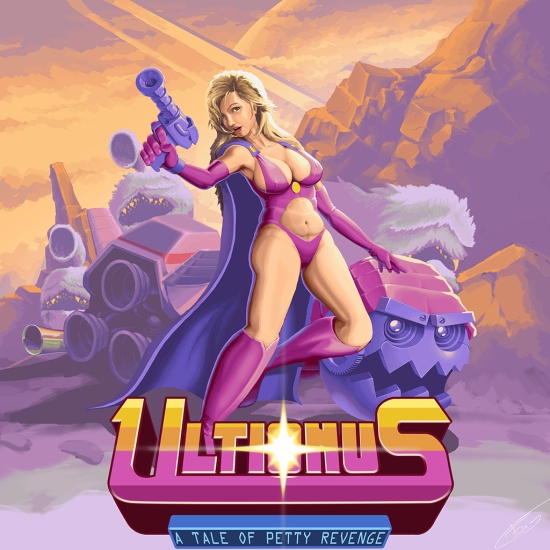
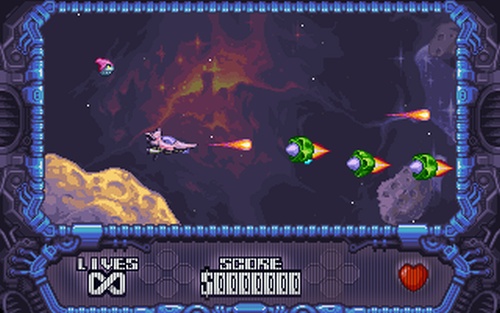
Genial entrevista, muchísimas gracias por compartirla 🙂
Conocí el Ultiounus a través de los mensajes a los bakers del Legend o Iya, y sin haber leído nada sobre él mi impresión fue la de «si este tío se ha cascado un Phantis 2»!!! me alegra muchísimo que haya podido contactar con Carlos Abril y de alguna forma ser la continuación espiritual, aunque sea en esencia; estoy seguro que para Andrew fue increible recibir el visto bueno de Carlos 🙂
También me hace gracia como ordena a Dinamic, Topo y Opera, yo también los habría ordenado así, aunque no veo los juegos de Opera tan imposibles, aunque sí son crueles con jugadores novatos…
Joder, el chaval se ha acabado currando TODO él solito (y hay que decir que la portada le ha salido bien, la chavala tiene cachillas :D). Habrá que probar este remake!
Realmente interesante 🙂
si, esta chulo a ver si lo pillo en intercambiosvirtuales